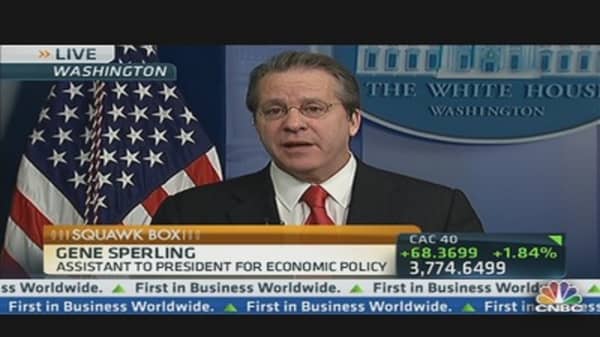President Barack Obama isn't "moving the goal posts" by asking for more revenue as part of a deal to avoid automatic spending cuts known as the "sequester," White House economic adviser Gene Sperling said on CNBC Monday.
The characterization that the president is "moving the goal posts" by demanding more revenue was made by Bob Woodward in a Washington Post op-ed.
But Sperling responded by telling CNBC, "[Woodward] has never been more wrong … The entire DNA of the enforcement mechanism, the sequester, was to bring both sides back to the table. That Democrats would compromise more on entitlements. That Republicans would compromise more on revenues," the director of the National Economic Council told "Squawk Box. "So the idea that this moves the 'goal post,' there's not even an ounce of truth to that," Sperling said.
Sperling also said, "We take into account the fact that we've done $600 billion in revenues. That was the number that sealed the agreement to avoid the "fiscal cliff" at the beginning of the year.
"But to get a [sequester] deal, compromise," he stressed, "you still need to do some closing of loopholes and tax expenditures to raise revenues together with entitlement [reform]."
(Read More: Which Tax Deductions Are Most Likely to Go?)
If a compromise deal isn't reached, Sperling argued, it would be the GOP's fault. "[Republicans] can't find one single penny of revenues. Not one single penny of loopholes or corporate tax expenditures. That's an absolutist position."
The financial markets don't seem that worried about the sequester going into effect because the debt ceiling issue is not part of this process, he said. "[Investors] do often assume we'll be reasonable at the end."
(Read More: White House warns states of looming pain from March 1 budget cuts)
Allowing the sequester to trigger as scheduled on Friday would be a "self-inflicted wound" on economic growth to the tune of a half percent, he said, citing estimates from the Congressional Budget Office.
(Read More: Budget Cuts to Restrain US Growth: Survey)
In the absence of a "grand bargain," Sperling suggested that Congress pass another short term fix to give the compromise route "more time."
—By CNBC's Matthew J. Belvedere; Follow him on Twitter @Matt_SquawkCNBC




